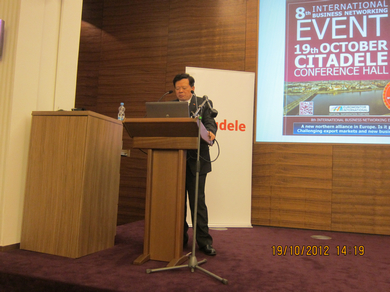Honorable Mr. Chairman,
Ladies and Gentlemen:
It's my great pleasure to be invited by Mr. Kreislers, Chairman of the International Business Networking Consortium Council, Mr. Buda, Chief Editor of KAPITALS, and Mr. Lodins, President of Riga Business Association, to participate in the 8th International Business Networking Event. It's also my honour to share with everyone my personal observation on China’s economy and its outlook. I do appreciate organizers' attention and interest in China and its economic relations with EU and Latvia.
The topic set for me is “China-potentially the main and the leading global economy, always open to your business”, which, in my view, reveals the broad impression and expectation of the world on today's China. Therefore I hope my speech will be of a help for you to get a more comprehensive and objective understanding about China.

Ladies and Gentlemen:
On 1st of October, 1949, New China was founded with a population of 500 million at GDP per capita $27 USD, and an average life expectancy of 35 years. 63 years on, especially the 34 years since Reform and Opening up policy, the Chinese people has successfully explored a path of socialism with Chinese characteristics, which brought remarkable changes to China. Since 1978 to 2012, the GDP of China increased at an annual rate of 10%. By which, in 2012, the national wealth created in one day is larger than the total annual output of 1949. China is now the world’s No. 1 exporter, No. 2 importer with the biggest foreign exchange reserves. Latest statistics has shown China's contribution to the world economic growth has reached about 20%. By the end of 2011, 79 companies out the fortune global 500 are Chinese companies, the second largest number behind only the United States.
Coupled with that, 2008 Beijing Summer Olympic Games and 2010 Shanghai World Expo were hailed as great success. In the second quarter of 2010, China overtook Japan becoming the world second largest economy. All these "Chinese miracles” has widely drawn the attention of the world, fostering an international perception that China has become a world power. Some even predict that China will soon surpass America and become world’s super power.
But, is China really becoming a super power? The response of the Chinese people is rather different. The poll conducted by a very influential Chinese newspaper <Global Times> showed 78% of the respondents still see China as a developing country and quite a number of them consider these flattering by outsiders is nothing but “Huyou”, a popular Chinese expression, or literally in English, trying to sweep China off its feet. So, we have two diametrically different answers to the same question, in and outside China, which reflect different perspectives.
Many years ago, when Chinese leaders were introducing China to foreign guests, they described China as both “big and small, strong and weak.” This is still the same case for today’s China. People on the outside tend to see the big and strong aspects of China, while we, as insiders, are more aware of its weakness and challenges. Just as some of my foreign friends say, if you haven’t been in Shanghai, you haven’t been in China. But knowing well about Shanghai doesn’t mean knowing about the whole China. Let me give you some examples for illustration of another China.
First, GDP per capita is quite low. China’s GDP has risen to the second place. However, in per capita terms, after being divided by a 1.3 billion population, in 2011 China has only 5,432 USD and at a world ranking of 89th. This figure is even less than half of Latvia’s GDP per capita in the same year.
Second, China also faces the serious challenge of uneven development. Many foreign tourists and businessmen visit Beijing, Shanghai and Guangzhou, think they have seen China. But those who have visited China’s far west will see it very differently. Some scholars say Three Worlds can be seen in China: Cities like Beijing and Shanghai as the First World, most of other provinces as the Second World, and some far west provinces as the Third World. China is still in the process of industrialization and urbanization, while the central and western part even in the early stage of that process. With 600 million people living in the rural areas and 135 million Chinese people live on less than one USD a day, the UN standard of poverty line, the number of people living in poverty is more than the total population of whole Japan.
Third, the industries structure is unreasonable. China is a big international trading nation, but its manufacturing sector is still at the lower end of the world’s value chain featuring exports with low technical and added-value. A small IPOD player designed by Apple Company, for instance, with a retail market price of 299 USD in USA, earns 163 USD added-value for the US Company and workers, but only 4 dollars labor cost for the Chinese company.
Last by not least, China’s social security system is not sound enough; China also faces pressure in the areas of health care, education, housing and employment. In a word, currently China faces many difficulties and challenges in its development path and still a long way ahead towards modernization. China will remain a developing country status in a long term.
Ladies and Gentlemen:
Based on these sensible understanding and judgment, the Chinese government in recent years has therefore set a developing strategy of speeding up the shifting of the growth model and adjusts the economic structure, so as to help sustain moderately rapid growth in the coming years and improve the quality and efficiency of this growth. As of this year, against the background of a gloomy global economy, China sticks to progress through maintaining stability, pared its GDP growth target to 7.5 percent, underlining its intent to make more room for growth mode transformation. With a growth rate of 7.7% for the first three quarters, now China is expected to realize the whole year target of 7.5%, destined to make new contributions to the recovery of world’s economy.
Ladies and Gentlemen:
Today we are living in a globalised world with unprecedented degree of interdependence and convergence of interests. China’s destiny has never been so closely linked with the destiny of the world. In this light, with the joint efforts of both Chinese and EU side, we have achieved three upgrades in China-EU relations, namely the cooperative partnership in 1998, the comprehensive cooperative partnership in 2001, and the comprehensive strategic partnership in 2003. Nowadays, with the political, economic and people-to-people exchanges as three pillars, China-EU relations have covered dialogue and cooperation in more than 60 sectors. EU and China have grown into indispensable partners to each other in both our development paths.
As the most vibrant and productive part of China-EU relations, business cooperation defied the downturn trend in spite of gloomy global economy. The EU has been China's largest trading partner for the eighth consecutive year. Our trade volume reached $567.2 billion USD in 2011, representing a year-on-year growth of 18.3%. Europe has continuously been China’s largest export market, source of technology transfer, destination of investment for Chinese companies, and in accumulative terms China's 4th largest source of foreign investment. China, on the other hand, is Europe’s largest source of import and the fastest growing export market. China is also Europe's second largest trading partner and export market. The growth of China-EU relations has brought tangible benefits to both sides.
Along with tackling the global financial and economic crisis, convergence of China and EU’s interests has integrated further. At the G20 Summit last June, China decided to contribute $43 billion USD to IMF resources increase so that the Fund may have more resources at disposal for tackling the European debt crisis. Over the past few months, China has continued to invest in the bonds of Euro-zone governments and those of the European Financial Stability Facility (EFSF), and actively discussed ways of cooperation with the European Stability Mechanism (ESM). As a responsible long-term investor, China has pursued greater diversity in its investment, and Europe has been one of the major markets for China's foreign exchange reserves investment. China will continue to play its part in helping resolve the European debt issue through appropriate channels. While further opening its market, the Chinese government is also taking effective measures to stimulate domestic consumption. According to the 12th Five-Year Plan from 2011 to 2015, domestic retail sales will increase with an annual rate of 15%. All these measures shall play an active role in boosting the economy and help the world out of crisis.
It is thus evident that China is EU's trusted friend and cooperation partner. China needs Europe for its development and vice versa. As the economic globalization develops rapidly today, China and EU should carry forward the spirit as if sailing in the same boat through difficulties, jointly oppose trade protectionism, create the wealth to make the cake bigger, and continuously expand the mutual benefits. With the joint efforts of the EU side, the Chinese side wishes to scale up trade; boost two-way investment; expand cooperation in infrastructure development; deepen cooperation in science, technology and innovation; unlock the cooperation potential in urbanization; and increase people-to-people and cultural exchanges, promote all-round, in-depth and balanced growth of China-EU relations.
Ladies and Gentlemen:
China regards Latvia as an important cooperation partner in the Baltic region. According to statistics of the Chinese Custom, in 2011 Sino-Latvian trade volume amounted to a record of $1.25 billion USD, and the figure reaches $927 million USD in the first 8 months of 2012, a year-on-year growth of 17.66%. Especially noteworthy is Latvia’s export to China has continuously maintained a rapid growth of 31% year-on-year. As Latvia has taken the lead in coming out of economic crisis, the Chinese enterprises have shown more and more interest in the Latvian market. Led by Huawei Technologies Corporation, several Chinese companies and individuals have invested in Latvia with a certain scale. Still, the convenient location of Latvia and opportunities brought by the possible introduction of Euro in 2014, has underlined fresh potential for cooperation in the areas such as infrastructure construction, transportation and logistics, manufacturing and wood processing industry, clean energy and environmental protection.
It is worth mentioning that the Chinese Premier Wen Jiabao met with the Latvian Prime Minister Dombrovskis twice this year in April and September, respectively in Warsaw, Poland and Tianjin of China. The two leaders exchanged views on further enhancing Sino-Latvia cooperation in all fields, especially economic areas. And during the meeting between leaders of China and Central & Eastern European Countries, the Chinese side initiated 'Twelve Measures for Promoting Friendly Cooperation with Central and Eastern European Countries', which aims to boost two-way investment and trade, expand cooperation in economic, financial areas and technology. In this context, Mr. Chen Jian, Vice Minister of the Ministry of Commerce of China is leading an investment and trade promotion delegation to Latvia early next week. During the visit, Vice Minister Chen will discuss with Mr. Pavluts, Minister of Economics of Latvia on the enhancement of business and investment exchanges. The two sides also plan to sign a MoU on Establishment of a Joint Investment Promotion Working Group. In coming November between the 25th to 27th, the Latvian and Chinese side will jointly hold the 8th Global China Business Meeting, which shall attract over 400 business elites from the world, to promote trade and business cooperation between China and Latvia, EU and other regions. Furthermore, China and Latvia are exploring possibilities for strengthening local government exchanges and tourism cooperation.
So by all means, China-Latvia relations are facing new opportunity and supported with fresh strong political will. With the joint efforts of the Latvian government and all sectors, the Chinese Embassy in Latvia will continue build efforts on the implementation of the cooperation consensus reached by both leaders. Especially by taking 'Twelve Measures' as an opportunity, we will help fostering a better business environment that promotes trade liberalization and facilitation, further expand and deepen trade and investment cooperation. It is then my hope that all of you here shall seize the business opportunity, make good use of the favorable trend of China’s economy prospect and broad market potential, tap the business cooperation potential and reap new progress of mutually beneficial cooperative relations between China and Latvia.
Thank you.







